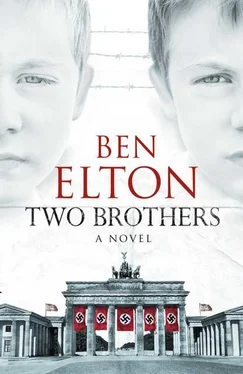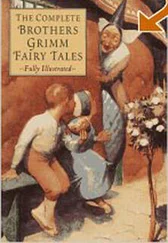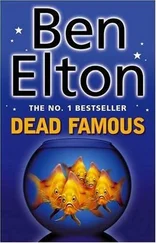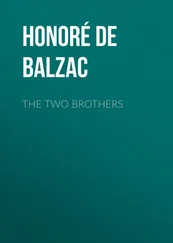‘ Buddhist? ’ Wolfgang observed incredulously. ‘That is just fucking weird.’
The silence seemed to deepen now. As loud almost in its way as the marching boots.
Frieda was to remark later that it was beautiful. That the silent contempt of a great city spoke more loudly than any amount of shouts and noise. Wolfgang disagreed. He thought it was terrifying from the start. That people had remained silent only out of fear. Fear of what those marching men were capable of. Of what might happen.
Of what did happen.
The column was almost past when it began. The vanguard of the troops were already nearly at the bridge over the river Spree and still the sullen mass of people kept their silence and the strutting troops their order. The two sides remained apart. The strange truce held.
And then, close to where Wolfgang and Frieda stood, their pram in front of them, a boy called out.
His high, half-broken voice clear despite the ringing, echoing noise of synchronized boots. Perhaps if the boy hadn’t been so young and his voice so shrill it wouldn’t have been heard, lost instead amongst the rhythmic crashes.
But the boy was no more than twelve or thirteen.
‘Piss off, you bone-headed bastards,’ he shouted. ‘Vlad Lenin for German Chancellor!’
Instantly two of the troopers broke ranks and pulled him from the crowd. A woman screamed and onlookers stood momentarily in shock as the Freikorps men clubbed the boy to the ground with their rifle butts, knocking his teeth from his mouth with the first blow. Then men and women from the crowd ran forward trying to save the dying boy, surrounding the two troopers and grabbing at their flailing rifles.
‘Oh God!’ Wolfgang shouted. ‘Get the babies out of the pram, get them high, quick, above your head. Quick!’
In that instant the silent crowd around them became a furious mob. People from behind surged forward while some in front stepped back. Immediately the little buggy went over, twisted and trampled underfoot in the very moment that Frieda and Wolfgang had snatched their babies from it.
‘Back! Back!’ Wolfgang barked. ‘For God’s sake don’t lose your footing.’
Terrified, each holding an infant above their heads, they struggled to move away from the trouble, pushing against the mob, staring into the contorted faces of outraged citizens who were trying to force their way towards it.
‘Let us through! We have babies,’ Frieda cried.
Some, immediately in front of her, tried to give way but those behind them kept pushing, imagining in that frantic moment that in their numbers they could be a match for well-drilled soldiers. The terrible minutes that ensued were to teach them their mistake.
A harsh voice called out. An order given and a bugle sounded. Instantly and as one man the troops brought their boots down to a crashing halt and then with another crash they executed a faultless quarter-turn to face the seething crowd. Then another shout, another bugle blast, and with a slap and a rattle the field-grey lines brought their rifles to the shoulder.
At this point the nightmare could have ended. Already the crowd had paused. Faced with so many gun barrels raised as one and hearing the sinister double snap of massed rifle bolts cocked in perfect unison, the unarmed civilians checked themselves mid-stride and began to fall back. Here now could have been an end to it. The boy who had dared to insult the mighty Freikorps was already dead and his would-be avengers had been properly subdued.
But this was Germany. This was Berlin in 1920, and the genie of violence never returned to its bottle once released, no matter how briefly the stopper had been off.
‘Fire!’ the voice shouted.
No bugle was needed this time, a volley of shots followed on the voice instantly, sending a fuselage of bullets thudding into the chests and faces of the stunned citizens.
As people fell dying to the pavement the rifle bolts double-clicked again but this time their perfectly drilled rhythm went unheard beneath the screams.
‘Fire!’ the voice shouted again and a second round of bullets tore into the people, into their backs now as the crowd was already in full retreat.
There was no third round. The anonymous voice spared the defenceless people that, but hundreds were already dead and more were dying in the blind panic of flight.
The Stengel family were just a few steps ahead of that panic, just emerging from the crowd as the first shots were fired. Wolfgang’s quick thinking had certainly saved Paulus and Otto’s lives, and possibly his and Frieda’s too, but they did not stop running for almost two kilometres and never once paused to look back.
At the Brandenburg Gate the troops were left alone with their victims. The voice cried out once more, then the Freikorps reformed their column and marched out of the city.
The following morning the briefly deposed government returned to office and the water was turned back on.
STONE SWALLOWED TWICE before he replied.
He had only just begun adjusting to the certainty that Dagmar was alive after so many years of wondering. And now this.
‘A spy? My sister-in-law is a spy? I find that –’ he struggled for the right word and failed — ‘very strange.’
‘Well, not necessarily a spy,’ the plump little man whom Stone had begun to think of as Peter Lorre conceded. ‘Shall we try and drum up some fresh tea?’
‘I don’t care about bloody tea!’ Stone snapped, the swear word sounding rather strange and forced in his half ‘foreign’ accent. ‘What do you mean, not necessarily a spy? Is she or isn’t she?’
‘Let’s put it this way, she definitely works for the East German secret police,’ Lorre replied, ‘that much we do know. Your sister-in-law is a Stasi girl.’
The Stasi. The very word made every hair on his body stand on end. All German police organizations made Stone’s skin crawl and would do until the day he died. Even the innocent, smiling young pastel-green and khaki-clad West Germans with their untidy hair and deliberately non-militaristic insignia were hard for him to stomach. But the Stasi were a new Gestapo. Working in the Foreign Office Stone knew enough about their activities to feel physically sick at the mere mention of their name.
This was his old enemy reborn.
Stasi. Even the word sounded like Nazi.
‘You’re wrong,’ Stone replied. ‘You must be. I simply can’t believe the woman I knew is a member of… that organization.’
‘Oh, she’s one of theirs all right. We can be very clear on that.’ It was the other man who answered, speaking for the first time since the interview had begun. The one Stone had cast in his mind as Humphrey Bogart. Except that Humphrey Bogart had never spoken with a Yorkshire accent.
‘Dagmar Stengel née Fischer works for the Stasi,’ Bogart went on, ‘which is why we’re interested in the fact that she made contact with you. Why do you think she wanted to make contact with you, Mr Stone?’
It was such a soft accent with its friendly vowels and timeless Englishness, like J.B. Priestley on the radio in the war. But it seemed to Stone that there was nothing soft or friendly about the intent of what the man was saying.
‘She’s my sister-in-law,’ he said.
Bogart merely smiled, leaving Peter Lorre to reply.
‘Yes. Your sister-in-law,’ he said, brushing shortbread crumbs from his tie, ‘and such was her filial affection that it took her seventeen years to get in touch. And then on the strength of this one contact, a contact that you could not even be sure was genuine, you began immediately to plan a trip to East Berlin, a trip which in your position you must have known would raise eyebrows within certain departments.’
Читать дальше












